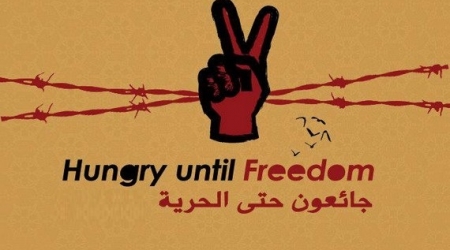The following is a list of demands presented by the hunger striking Palestinian detainees, who intend to gradually expand their strike to include all Israeli prisons and detention centers, across occupied Palestine.
1. Installing public phones in all prisons, in every section of the prisons, so that the detainees can contact their families.
2. Family visits:
a. Resuming visits for siblings, grandparents and other non-immediate family members, that were suspended by the International Committee of the Red Cross.
b. Allowing family visits twice a month, without interruptions.
c. To stop preventing any immediate or non-immediate family members from visiting with the detainees.
d. Increasing visit times from 45 minutes to 90 minutes.
e. Allowing the detainees to be photographed with their families once every three months.
f. Building the needed facilities in front of prisons to provide comfort to visitors and families.
g. Allowing all children and grandchildren of the detainees to visit with them.
3. Medical issues:
a. Closing the Ramla Prison Clinic, as it lacks basic essential equipment and medication.
b. Ending medical neglect of the detainees.
c. Allowing regular medical checkups.
d. Ensuring surgery without delays for ailing detainees.
e. Allowing specialized physicians from all medical fields to examine the detainees.
f. Releasing all disabled prisoners, prisoners with special needs and chronic diseases.
g. Exempting the detainees from the costs of medications.
4. Agreeing to the demands of female detainees, including special transfers to other prisons and allowing direct physical contact with immediate family members.
5. Transfer Vehicles (Known as Posta):
a. Treating the detainees in a humane manner during transfers.
b. Stop holding the detainees for extended periods at military barriers, and to return them back to prison immediately after every court session.
c. Providing humane shelter at barriers and roadblocks while transferring the detainees to and from prisons and courts, so that the detainees can rest during the extended transfers.
6. Adding satellite TV channels that fit the needs of the detainees (local and Arabic channels).
7. Installing air-conditioners in prisons, especially Majeddo and Gilboa’.
8. Re-installing kitchens in the prisons and make them under the supervision and use of the detainees.
9. Allowing books, newspapers, clothes, food and other special items to be transferred to the detainees during visits.
10. Ending the policy of solitary confinement.
11. Ending Administrative Detention policy (holding the detainees without charges or trial).
12. Reinstating the educational programs at the Hebrew Open University for all detainees.
13. Allowing the detainees to undergo high school exams, as previously agreed.

